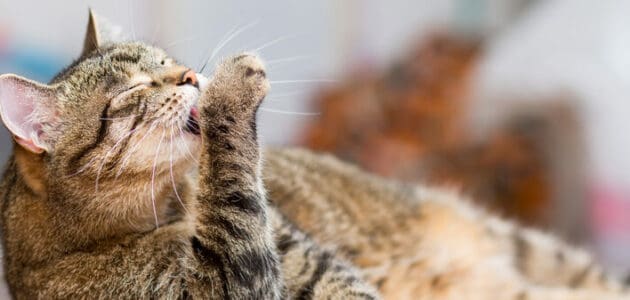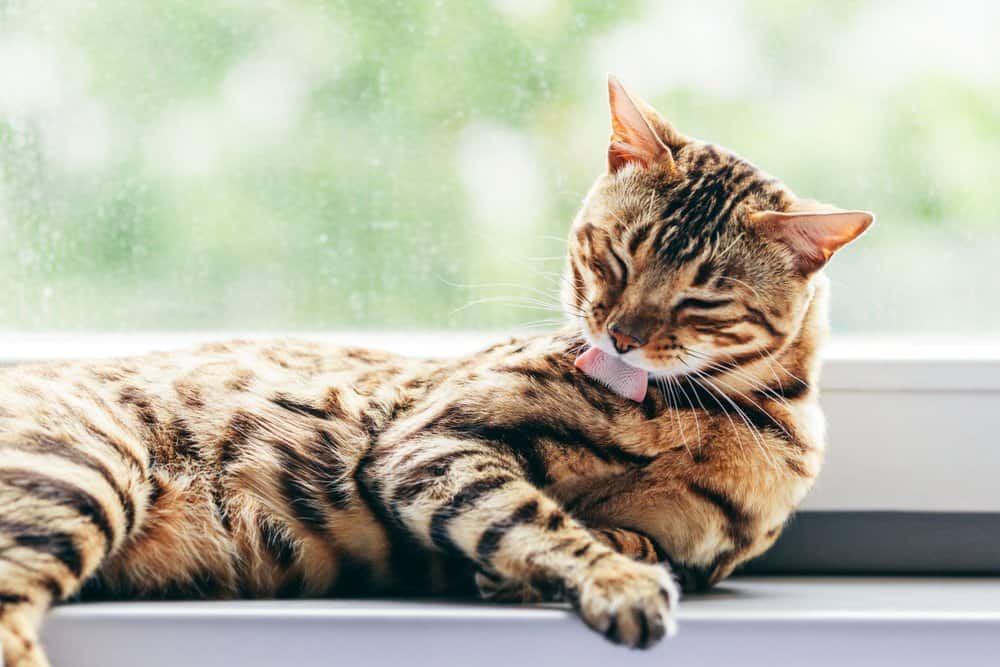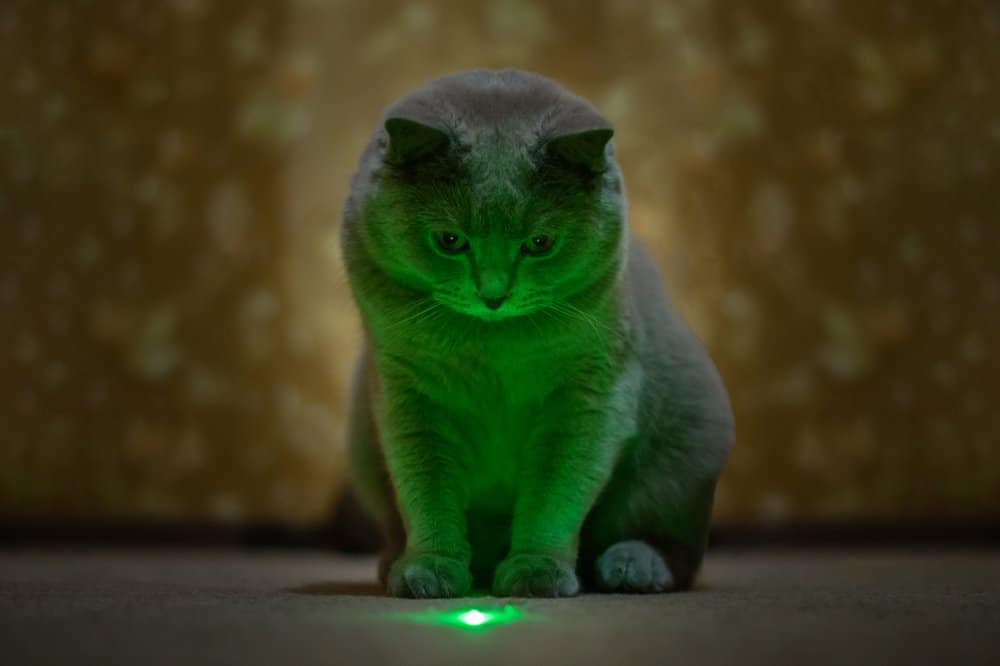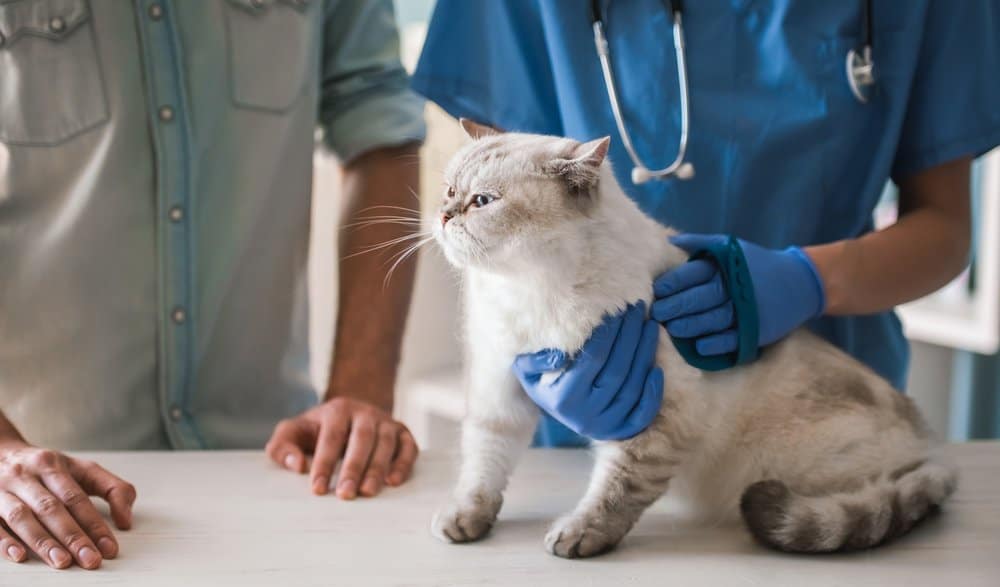How to Stop Your Cat From Overgrooming

Cat overgrooming might not be the worst thing a cat owner faces, but it certainly is one of the most frustrating because when you notice it, it often has caused damage already.
The good news is, there is a lot that can be done for them and it’s never too late to start helping. The most important thing to do is to pinpoint the cause of the problem, when this is done, finding a solution may be easier than you think.
What Is Overgrooming?
Overgrooming can be classified as a condition in which a cat spends an excessive amount of time licking itself, resulting in loss of hair and skin lesions.
Grooming releases endorphins which will help manage stress. This feeling makes the cat comfortable and if stressed out, the cat can become addicted to the feeling and start overgrooming.
Cats will normally only engage in this behavior when they are alone. Since they feel comfortable when someone familiar is around them, they tend to avoid overgrooming when you’re near them. This can make it hard for people to detect the problem until there’s physical evidence.
If you see it happening, however, it is strongly recommended that you do not punish the cat as that would only add up to the stress they feel. And realistically the cat wouldn’t even understand why it’s being punished so it wouldn’t help in any way.
Why Do Cats Overgroom?
Overgrooming in cats, if without a medical cause, is called psychogenic alopecia. However, this is not the sole reason for overgrooming, the problem can also be physical or stress-related.
Cats are creatures of habit as well as territorial and any change in their environment can result in stress. Like in numerous other living beings, stress in cats can cause many problems such as ulcers or negative behavioral patterns.
In times of stress, humans often turn to anything that offers temporary relief such as food, drugs, alcohol, cigarettes, working out, games, the options are endless. Cats tend to turn to overgrooming; it’s their temporary relief.
There are multiple reasons which can cause a cat to resort to overgrooming, ranging from stress to infections. We’ll go over some of the most common ones below.
Excessive Stress
Several combined stressors cause the most prevalent conditions which develop into psychogenic alopecia.
Some of the most common causes of stress are:
- The sudden absence of a family member, either due to long working hours, divorce, going away to study, or death.
- Addition of any other pet in the family.
- Moving to another apartment or house.
- Moving the litter box.
- Chaotic environment in the household.
- Rearranging the furniture at home.
- Poor environmental conditions such as hoarding or lack of cleaning.
Medical Causes
Cats can also overgroom because of medical conditions. For instance, if they have a problem with parasites causing itching or an infection, cats would overgroom to relieve the itching or even any pain they may be feeling.
Parasites are the most persistent cause of cat overgrooming. If this is the issue you will notice your cat doing it even around you, and at all times. Effective treatment can eliminate this problem within weeks.
These medical problems can be due to poor environmental conditions which cause the cat to have active contact with fleas, rotten food, and filthy areas. Cats may develop allergies to such things which will also result in overgrooming.
There are also other causes such as bacterial infections, food allergies, skin rashes, loneliness, or constipation. A veterinarian will undergo blood and skin tests to obtain a diagnosis and start introducing medication.
Fleas
Having parasitic fleas demands immediate treatment and care. No one wants to have a pet infected with blood-sucking parasites. Cats must be regularly checked for fleas, especially if they weigh over 9 lbs. Also, apart from medication and topical care, changing the level of hygiene is extremely important as fleas love staying in unhealthy and dirty conditions.
Applying skincare lotions on the cat is an easy solution, but if the symptoms get worse, then medication needs to be introduced. If the cat is fussy and doesn’t want to ingest tablets, grind them and mix them with its food.
Parasitic fleas can be anywhere in the house, and once they take a liking to your cat, chances are that they will go there again. The worst part of having fleas in your house is that you can barely see them, and they will lay eggs in places you won’t likely check and this way they can survive and thrive for a long time.
Psychological Causes
If the diagnosis does not reveal any medical or environmental cause, then your cat may have developed psychogenic alopecia.
If your cat is facing many threats, conflicts of change in the environment, they will start grooming to comfort themselves. Eliminating the problem can solve this issue, but if the behavior persists after everything is stabilized, then it might have become a compulsive behavior.
Although psychogenic alopecia isn’t deadly, it still demands proper medical care as it will compromise your cat’s quality of life.
What Is Psychogenic Alopecia?
Psychogenic alopecia is a psychological condition characterized by the obsessive behavior of a cat involving overgrooming.
Stress and anxiety may trigger this behavior. Grooming is a very relaxing and calming activity for cats, especially when they’re facing changes to their environment or some external threat.
Usually, this behavior ceases to exist once the threat is eliminated. But if the cat continues to groom incessantly, even when the threat is gone, then unfortunately the licking has become an uncontrollable compulsive behavior. This usually results in sores.
We’ll cover the best ways to treat psychogenic alopecia below.

Analyzing the Situation
When facing overgrooming, some questions need to be answered and only the cat’s owner knows the exact answers as only him/her is familiar with the routine and behavior of the cat.
- Have you moved to a new place recently?
- Have you acquired a new pet?
- Have you acquired a new household member, such as a newborn, a visiting relative, or a tenant?
- Has the litter box been modified or taken away?
- Have you changed the location of the litter box?
How to Tell if Your Cat Is Overgrooming
If you answered yes to any of the questions above and you see your cat overgrooming then you must examine the cat physically and visit a veterinarian to be certain about the condition.
Overgrooming can be detected as a bald patch or stubbly area usually around the inner thigh, foreleg, and belly. You must examine thoroughly because the redness of the skin or development of a sore depicts the intensity of the problem.
You can see what different skin problems look like here.
Usually, cats spend a good chunk of time grooming. On a normal day, a cat may spend 30% of its waking hours grooming; it becomes an issue when they do it longer than that. Sometimes even interfering with their sleep or meal times.
Overgrooming isn’t lethal but it sure can cause significant damage to your cat’s health. If your cat is showing any of the following signs, then you need to start worrying and taking action:
- Development of rashes or loss of hair in a particular area.
- Violent scratching.
- Not focusing on any other activities other than grooming.
How to Stop a Cat From Overgrooming
Now that you know the causes and indicating the behavior of overgrooming, it’s time to learn how to tackle the situation. First, the best thing to do is to consult a veterinarian to rule out any probability of harm to your cat.
Once all medical causes are ruled out and you are sure it’s due to stress, you must try to make your cat comfortable and help him find another way to release stress. This should be easy since the cat has an emotional attachment to you and you being around will already help soothe it.
A few tips to help your cat release stress are:
Offer Them a Reassuring Scent
If your cat is missing someone and is depressed because of their departure, a good way to help is to have an unwashed shirt with that person’s scent inside a sealed plastic bag. Offering it to your cat to smell from time to time will help improve its mood greatly.
Slowly Introduce Any New Pets
If you have brought another cat or animal into your household, there is a high chance that your cat might not like it. Therefore, you should introduce your cat to new animals as slowly as you can and give them time to familiarise themselves with the new animal.
Play With Your Cat
The best way to keep your cat occupied and focused on something other than grooming is to take some time to play with it. Playing with your cat makes it feel very comfortable and will most certainly take its mind off what is causing its anxiety. It is best to choose interactive games such as laser chase or chase the fishing pole.
Use Calming Pheromones
Artificially-produced pheromones can be used to help the cat release stress. These pheromones are available in sprays or wall plug-ins and produce a scent similar to what cats produce naturally thus inducing a calming effect.

How Can a Veterinarian Help?
The veterinarian would help identify all sorts of medical complications, allergies, infestations, sores, fungal and bacterial infections. The physical examination by the doctor rules out the probability of any problem to be left unattended and the ailments once identified are easy to treat.
The veterinarian usually prescribes anti-anxiety drugs, to put a halt to the licking habit. These medications run for a very short amount of time and are only to relieve stress.
All other complications, such as psychogenic alopecia, are dealt with according to the intensity of the wound, infection, or psychological stress levels.

Drug Therapy
Anti-depressant and anti-anxiety medication must be tried if the cat’s behavior remains uncontrollable even after fixing all the environmental problems. Drug therapy must be used as a last option and only when prescribed by a registered veterinarian.
The medicine can be delivered orally or via injection and it can take weeks to show any effects, but it is a significant step in controlling the cat’s behavior.
Treating Psychogenic Alopecia
The identification of the problem is the first step in the eradication of the issue. If your cat is suffering from psychogenic alopecia, there’s no need to panic. Although it is a chronic lifelong condition, it is manageable to the point where your cat will barely suffer from it.
For this to happen, finding the problem and not allowing it to reoccur is crucial. You will need a veterinarian to officially diagnose it, and treat it, as the condition does demand medical care. The veterinarian usually undergoes several diagnostic tests to determine the cause of the issue accurately. And anti-inflammatories and skin creams will treat skin sores and irritations.
A food-related issue can be irradicated by changing the cat’s diet. Unfortunately, some allergies are not diagnosable, but proper medical care can treat any irritation caused by these allergies.
Home Remedies and Treatments
The identification and elimination of any disturbances must be taken into account if the cat is found to have psychogenic alopecia linked with anxiety and stress.
Although a veterinarian can provide the best available treatment, some changes in the environment and the cat’s diet can also be beneficial.
Some of the home remedies that can help while treating psychogenic alopecia are:
Keep Your Cat Entertained
Keep your cat interested in new games, catnip toys, and even videos for kittens. Cats tend to love scratching posts the most, which they can also use to comfort themselves. The toys should be changed frequently to keep the cat engaged.
Introduce new perching areas to keep them curious and exploring. Also, a small indoor garden including catnip can be very useful too.
Give Your Cat a Routine
Maintain a routine for your cat as much as possible. This should include feeding, and exercising at the same time every day. This also includes scheduling playing with your cat daily; try your best to give at least 10-15 minutes of playtime to your cat every day.
Ask Your Vet for Advice
Ask your veterinarian about behavior modification techniques. They may be able to give training tips specifically tailored to your cat and their needs.
Avoid Punishments
Punishing your cat will worsen the problem. Generally, shouting at your pet or punishing it isn’t good anyways, however, this may prove catastrophic when you are trying to help your cat recover from a psychological illness.
It’s Not the End of the World
Although it can be stressful to have a pet go through these issues, you must remember how much more stressful it is for them. Proper management of their environment should be enough to avoid any issues, but we can’t always control everything, and you must be prepared to deal with problems as they come.
Overgrooming is a real problem especially since it affects your cat’s psyche so deeply. Always make it a priority to look for professional help before trying to deal with the problem by yourself, as sometimes it may be something worse than stress.




